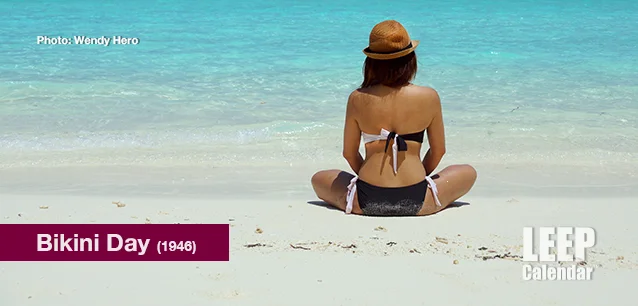 AD
AD
Today is: November 22
Scroll to explore events active on this date.
Additional Events on LEEP
LEEP INK FEATURES

August is Appropos
A toddler playing in the fountain at a park in Santa Fe, New Mexico—Photo LD Lewis. In August, we live through the Dog Days of Summer. It's hot and often humid, and those ...

September is Sassy
Can you hear that sigh of relief from parents worldwide? Yes! September marks the return of students to school, a global phenomenon. Preparations for the ACT and SATs begin earnestly for ...

OOH LA LA, October
October is the busiest month for events, with 5% more happening than in May, the second most eventful month. Sailing enthusiasts will be glued to the finals of this year's Am...
About Bikini Day
Women , United States
Ends: Jul 05, 2025
DESCRIPTION:
Today is the anniversary of the aquatic clothing style that has enchanted men and terrified women into dieting for nearly five generations. The term "bikini" was coined by French automotive engineer Louis Réard in 1946 after the Bikini Atoll, a site in the Pacific used to test atomic bombs. He believed his two-piece swimwear would create an "explosive" cultural reaction akin to an atomic bomb.
Réard's design was not the first two-piece swimsuit. Archaeological evidence, including Roman mosaics, show women wearing two-piece garments during athletic events as early as 300 AD. Swimming as a leisure activity didn't catch on until the nineteenth century. In 1837, London opened its first public swimming pool, and the Metropolitan Swimming Clubs of London, established in the 1860s, held regular swimming competitions. Though now considered recreation, swimwear followed current fashions with modesty as a requirement.
Following World War I, swimsuits, like fashion, became less conservative. By the early 1940s, two-piece bathing suits were available, but they still covered the navel and a woman's posterior.
Réard's bikini, introduced in Paris on July 5, 1946, was a radically streamlined design. It was so small that Réard claimed it wasn't a genuine bikini unless you could pull it through a wedding ring. Despite its initial controversy due to its revealing design, the bikini gained broad acceptance by the 1950s and 1960s, particularly in films, with celebrities, and in fashion magazines.
The 1960s saw the rise of the "Monokini," a topless swimsuit designed by Rudi Gernreich, and later, the "Microkini," an even more revealing style. While these styles did not gain the same level of popularity as the bikini, they represented the ongoing trend toward more revealing swimwear.
By the 21st century, the bikini became a multi-billion-dollar industry. It remains a staple of beachwear fashion in many parts of the world, and its influence extends beyond swimwear, influencing lingerie, activewear, and even general fashion trends.
VIDEOS
Currently, this event does not have supporting videos.
SUPPORTING DOCUMENTS
Currently, this event does not have supporting documents.
ADDITIONAL IMAGES
Currently, this event does not have supporting images.
Where would you like to go now?
 AD
AD


/footer-logo.svg)
